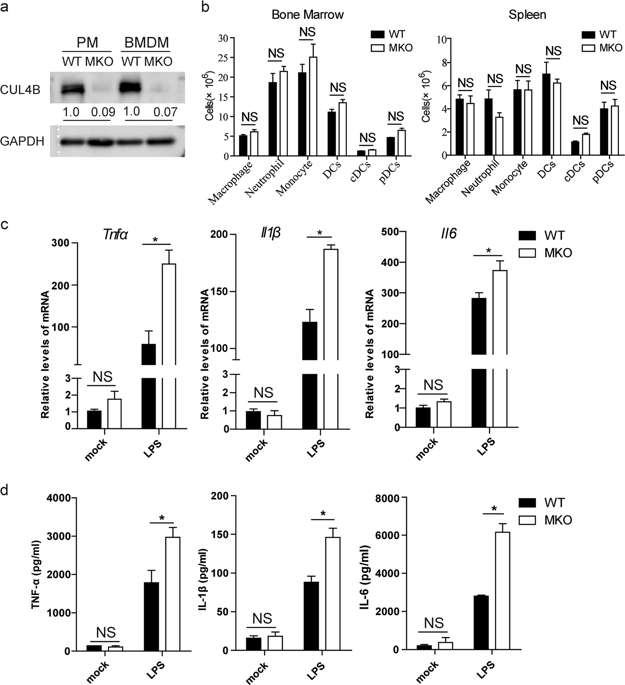Cellular & Molecular Immunology ( IF 24.1 ) Pub Date : 2019-11-15 , DOI: 10.1038/s41423-019-0323-0 Yu Song 1 , Peishan Li 1 , Liping Qin 1 , Zhiliang Xu 1 , Baichun Jiang 1 , Chunhong Ma 2 , Changshun Shao 3 , Yaoqin Gong 1

|
Toll-like receptors (TLRs) play critical roles in innate immunity and inflammation. The molecular mechanisms by which TLR signaling is fine-tuned remain to be completely elucidated. Cullin 4B (CUL4B), which assembles the CUL4B-RING E3 ligase complex (CRL4B), has been shown to regulate diverse developmental and physiological processes by catalyzing monoubiquitination for histone modification or polyubiquitination for proteasomal degradation. Here, we identified the role of CUL4B as an intrinsic negative regulator of the TLR-triggered inflammatory response. Deletion of CUL4B in macrophages increased the production of proinflammatory cytokines and decreased anti-inflammatory cytokine IL-10 production in response to pathogens that activate TLR3, TLR4, or TLR2. Myeloid cell-specific Cul4b knockout mice were more susceptible to septic shock when challenged with lipopolysaccharide, polyinosinic-polycytidylic acid or Salmonella typhimurium infection. We further demonstrated that enhanced TLR-induced inflammatory responses in the absence of CUL4B were mediated by increased GSK3β activity. Suppression of GSK3β activity efficiently blocked the TLR-triggered increase in proinflammatory cytokine production and attenuated TLR-triggered death in Cul4b mutant mice. Mechanistically, CUL4B was found to negatively regulate TLR-triggered signaling by epigenetically repressing the transcription of Pten, thus maintaining the anti-inflammatory PI3K-AKT-GSK3β pathway. The upregulation of PTEN caused by CUL4B deletion led to uncontrolled GSK3β activity and excessive inflammatory immune responses. Thus, our findings indicate that CUL4B functions to restrict TLR-triggered inflammatory responses through regulating the AKT-GSK3β pathway.
中文翻译:

CUL4B 通过抑制 Pten 转录负调节 Toll 样受体触发的促炎反应
Toll 样受体 (TLR) 在先天免疫和炎症中起关键作用。微调 TLR 信号的分子机制仍有待完全阐明。组装 CUL4B-RING E3 连接酶复合物 (CRL4B) 的 Cullin 4B (CUL4B) 已被证明通过催化单泛素化以进行组蛋白修饰或多泛素化以进行蛋白酶体降解,从而调节多种发育和生理过程。在这里,我们确定了 CUL4B 作为 TLR 触发的炎症反应的内在负调节因子的作用。巨噬细胞中 CUL4B 的缺失增加了促炎细胞因子的产生并减少了抗炎细胞因子 IL-10 的产生,以响应激活 TLR3、TLR4 或 TLR2 的病原体。骨髓细胞特异性Cul4b当受到脂多糖、聚肌苷-聚胞苷酸或鼠伤寒沙门氏菌感染时,基因敲除小鼠更容易感染感染性休克。我们进一步证明,在没有 CUL4B 的情况下,增强的 TLR 诱导的炎症反应是由 GSK3β 活性增加介导的。在Cul4b突变小鼠中,抑制 GSK3β 活性有效地阻断了 TLR 触发的促炎细胞因子产生的增加并减弱了 TLR 触发的死亡。机制上,发现 CUL4B 通过表观遗传抑制Pten的转录负调节 TLR 触发的信号传导,从而维持抗炎PI3K-AKT-GSK3β通路。由 CUL4B 缺失引起的 PTEN 上调导致不受控制的 GSK3β 活性和过度的炎症免疫反应。因此,我们的研究结果表明,CUL4B 通过调节 AKT-GSK3β 通路来限制 TLR 触发的炎症反应。


























 京公网安备 11010802027423号
京公网安备 11010802027423号